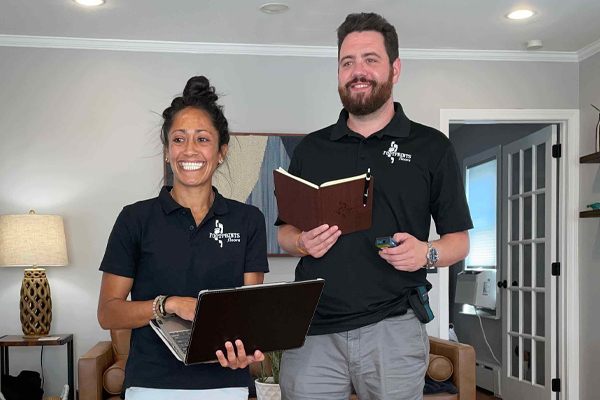
Lee Becker and Erica Garcia launched their Southern Connecticut franchise of Footprints Floors, a flooring installation company, in late January of this year, with the aim of utilizing their experience in customer service in a new industry.
The business partners both came from sales positions in the beverage industry, with Garcia still employed in that field while juggling Footprints Floors part-time while Becker carries a full-time focus.
“We both learned and realized about ourselves that we get excited about taking care of the customer,” Becker said. “When I was selling alcohol, my favorite part was educating the customer or the consumer on the product. Now, I”™m doing the same thing, just in a different industry.”
Becker and Garcia pursued a career through Footprints Floors because they believed that the flooring company would grant them a good deal of autonomy free from a large corporation”™s restrictions. The Southern Connecticut franchise, which provides services from Greenwich to Fairfield, offers the potential of an annual target revenue goal of about $300,000.
“That”™s what we”™re tracking towards, and we”™re looking good,” Becker said. “That”™s kind of the benchmark of what the average first-year franchise owner does.”
What especially attracted the duo, given their experience in customer service, was the prospect of directly working and coordinating with homeowners.
“Home improvement can be an industry where customers are confused, don”™t know what”™s going on, often feel taken advantage of,” Becker said.
“Our opportunity is to be transparent and upfront.”
Footprints Floors”™ model is oriented toward customer service, with homeowners being responsible for selecting and purchasing materials for the installation job. Becker and Garcia give an estimate upon arriving at a homeowner”™s residence and serve as a conduit between the homeowners who obtain the materials and the subcontractor workers who perform the installation. Footprints Floors interfaces the two parties by maintaining constant communication and checking in daily, as well as keeping the homeowner informed. This can mean instilling realistic expectations for a job, by telling the homeowner that something cannot be done or telling them that there is a cheaper alternative.
“I have, in fact, lost some jobs because people said, ”˜Well, we want exactly this,”™ and I said that”™s kind of impossible,” Becker recalled. “But what that means is that, on the back end, we”™re getting a lot of positive feedback from our customers.”
The subcontractors go through a vetting process before Becker and Garcia hire them for a job, which involves questions on if they are insured and what machines they used.
“If all those things are good, we”™re having a positive conversation, we”™re talking about pricing and stuff like that, then we”™ll start a crew off on a smaller job, one that, if we need to go back and fix it, we are able to,” Becker added, “Then we”™ll build our crews up from there.”
“We don”™t hire people, we hire businesses that are also insured that are excellent tradespeople that might not have the soft skills of service and sales and communication,” Becker said. “That”™s what we”™re bringing to the table: a much more customer-focused view on the operation.”
Becker and Garcia keep three trades in mind when looking for crews to hire: the installation trade for laying the luxury vinyl plank flooring and laminate flooring, the sanding and finishing trade that includes the installation of hardwood floors, and the tile trade that Becker identifies as being the most expensive and perhaps the most labor intensive.
“Tile is as much an art as it is a trade,” he explained. “It”™s about patterns and lining things up and properly putting the glue, the thinset, and putting the proper backer board underneath to support the tiles.”
Becker and Garcia plan to see their franchise grow by purchasing additional locations in Connecticut and bringing aboard more employees. Their chief strategy for achieving these goals is quality customer service.
“It”™s easy to be the cheapest person in the market, it”™s easy to just take on many jobs and get the work done,” Becker stated. “What we bring differently is not just the quality of work, it”™s the quality of our interactions.”





















